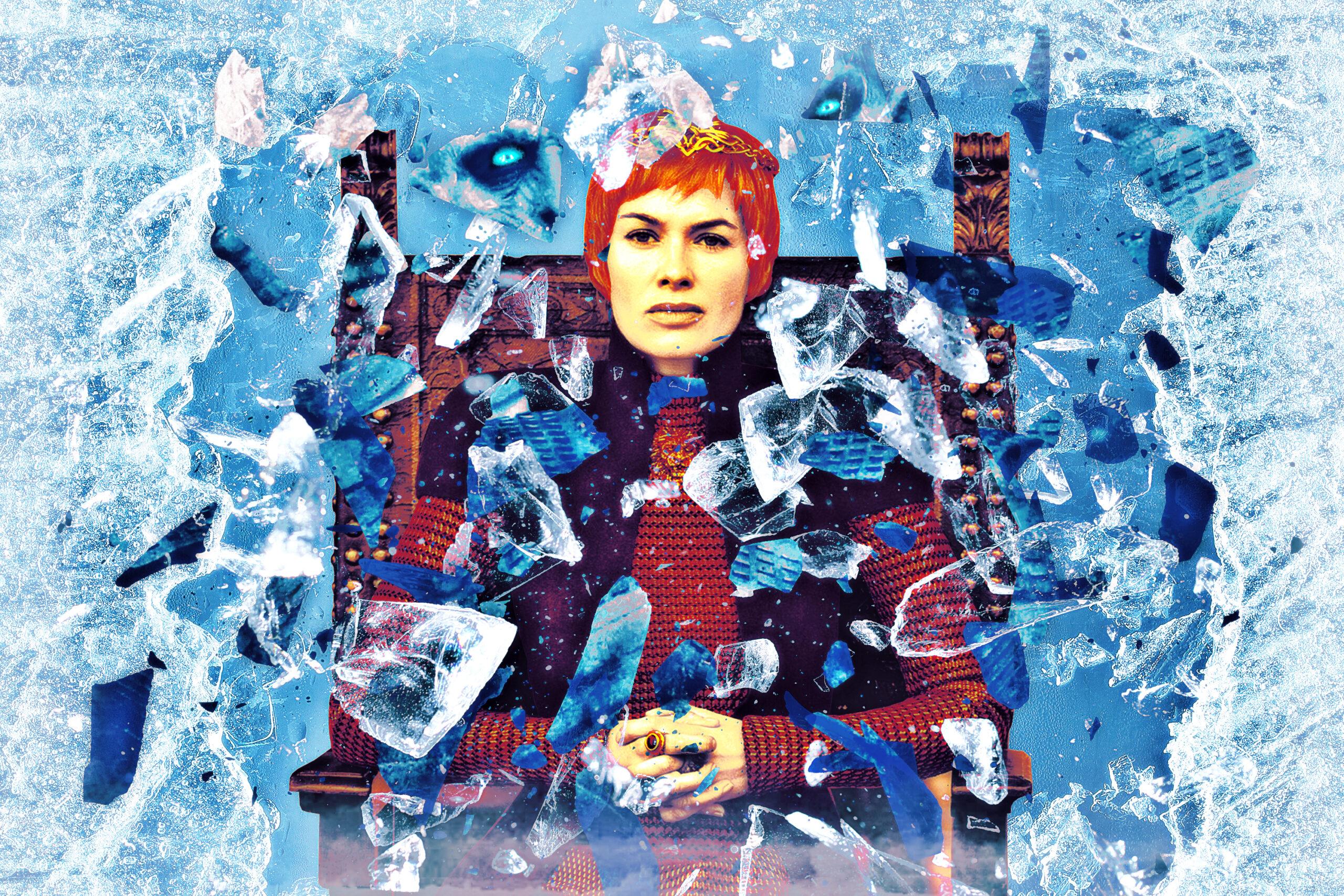Can ‘Game of Thrones’ Return to Its Complex Roots?
The battle between the living and dead relied on the simple good-versus-evil trope that classic ‘Thrones’ eschewed. Can the battle between the living and living bring back the show’s shades of gray?
Is Season 8 of Game of Thrones still the story of George R.R. Martin, the author whose A Song of Ice and Fire novels inspired the television phenomenon? Or is it more the story of David Benioff and D.B. Weiss, the showrunners who adopted the tale for TV? The evidence to this point is mixed, and the answer will inform the tenor and message of the culmination of the show.
On the one hand, the showrunners met with Martin in his Santa Fe home in 2013 to learn “how everything ends,” as Benioff told Vanity Fair. “We just sat down with him and literally went through every character.” From this meeting, Benioff and Weiss learned, for instance, of three “holy shit moments” that Martin had planned: Shireen’s death by burning, Hodor’s name etymology, and a third yet-to-be-revealed surprise.
On the other hand, Benioff explained after Sunday’s episode that the pair had known Arya would kill the Night King for “probably three years now.” That means this massive development was not Martin’s third shocker but rather a TV invention (as was the actual character of the Night King). It also means some moments that now seem like effective foreshadowing—such as Melisandre’s “brown eyes, blue eyes, green eyes … eyes you’ll shut forever” line to Arya back in Season 3—appear as such only in retrospect, and weren’t prepared with this climax in mind.
Martin’s outline of the novels’ resolution (if the next books ever come) should ideally inform the show’s, but the greatest piece of resolution to date abandoned the page entirely—and left fans split about the sudden end to the Night King’s mysterious arc. The show has fully turned from its fantasy genre elements to its political side, where it’s most consistently shone. Yet its apparent abandonment of the story’s fantasy foundation lingers. Viewers who wanted the Night King to unveil more nuanced motivation learned that no such complexity would come before his demise, and now almost assuredly will not gain a deeper understanding before the series concludes. Viewers who considered the human responses to the Night King’s threat the most complex aspect of his villainy likely found his removal underwhelming as well. The major characters split, essentially, into their expected camps: Jon and Daenerys committed to the humans’ cause, and Cersei against it, without much further subtlety to their decisions.
The show’s shift back to human-against-human strife for the remaining three episodes offers a new opportunity for Thrones to mine its characters’ complexity before the final credits roll. At its core, this is a story about nuance—about heroes turned villains and villains turned heroes, about antagonists with unknowably tragic backstories, about characters forced into choosing from a set of imperfect options and characters whose personality and actions don’t mesh.
As Martin wrote in 2000, “The battle between good and evil is a legitimate theme for a Fantasy (or for any work of fiction, for that matter), but in real life that battle is fought chiefly in the individual human heart. … In real life, the hardest aspect of the battle between good and evil is determining which is which.” That observation isn’t to say that all of his characters are mottled with shades of gray (see: Bolton, Ramsay), but his story hums when characters occupy that middle ground, and when the debate over what is good and what is evil clouds the judgments of both characters inside the world and the audience looking in.
If this central idea is to last through the endgame—if Martin’s thoughts on “how everything ends” with “every character” truly guide the showrunners through the landing—now is the time for such complexity to return to the screen. One pessimistic view of the remaining setup is that the show still finds itself in clear-cut good-versus-evil territory, just this time with humans comprising both sides. The remaining big bad is a more compelling villain than the speechless Night King, but the Cersei who sits atop the Iron Throne seems like a more cartoonishly villainous version of her previously shaded self. Tyrion goofed in trusting his sister’s promise for a cease-fire because he thought that Cersei might have a shred of gray left, but she is now a pure antagonist. (Euron Greyjoy, it almost goes without saying, has not been developed nearly thoroughly enough to factor into the dynamic; the setup’s essentials are Cersei vs. The World.)
Still, it would be rash to conclude that Benioff and Weiss have completely brushed off Martin’s sensibilities before the final three episodes air. There’s time left for the kind of complexity that’s fueled this show at its best to reappear. The question thus beckons: Where might that quality emerge?
The thorny relationship between Dany and Jon—and, by extension, Sansa, who of all the alliance’s key figures has proved herself the most capable politician—is the first and most obvious area in which the showrunners could bring this type of complexity back to the series. It’s hard to imagine any battle being “fought chiefly in the individual human heart” more than one between two lovers/relatives/potential contenders for the same crown. Dany and Jon didn’t have much time to chat after Jon’s revelation that he’s the true heir to the Iron Throne in the crypts just before the Battle of Winterfell, but that conversation should take center stage now.
The key players have their own questions to confront as that tension rises to the forefront. For Jon, does he even want the Iron Throne? He hasn’t expressed much one way or another since learning of his true heritage from Sam in the first episode of this season. In the paraphrased words of Inigo Montoya: He’s been in the Walker–fighting business so long; now that it’s over, it’s unclear what he’ll do with the rest of his life.
For Dany, how closely will she follow her family’s fiery impulses? Her next step in the war against Cersei should provide an early indicator. Even though she stated in Season 7 that she doesn’t want to be “queen of the ashes,” rejecting an outright attack on King’s Landing at that time, the thought of dragons’ roasting Cersei’s stronghold must tempt Daenerys after she lost so many Dothraki and Unsullied soldiers while fighting the army of the dead at Winterfell. This move would have some precedent, as Aegon the Conqueror used his dragons to tie the Westerosi continent to Targaryen rule despite beginning his conquest with fewer than 1,600 men, and earlier visions of the Red Keep’s destruction still need payoff. A Jon-Dany showdown or a full heel turn from the latter would imbue the final episodes with much-needed oomph.
The second area where complexity could emerge involves the three Lannister siblings, who are all still alive and enmeshed in a strange web of love, deceit, and begrudging respect forged by a shared family history. The valonqar prophecy—which hasn’t been included on the show but warns how Cersei is destined to die in the books—might receive resolution in the form of either Tyrion or Jaime, with a “younger brother” ostensibly destined to kill the queen. Even if this portent doesn’t transfer to the show, further interactions among the three siblings would be a boon to the back half of Season 8. Even amid narrative stumbles elsewhere in Season 7, the show crackled with excitement during every tense conversation among the Lannisters. And their drama encompasses family friend Bronn as well, as the sellsword’s new mission—to kill the two brothers at Cersei’s command—injects a new dose of friction into the Lannister dynamic.
The third area involves questions about the metaphorical wheel of power Dany has so famously vowed to break. The so-called “Last War” would be much less satisfying as the end of the fight for the throne than the start of a conversation about the chair’s very existence, as all remaining strands of complexity condense in some way to a question about method of governance. Jon and Daenerys don’t seem to care about the implication of incest when they learn about his parents; they care about what it means for lines of succession. Sansa mistrusts the Targaryen queen because she wants independence for the North. Cersei opposes the bulk of the remaining characters because she wants to retain her power, and they want to strip it. When it comes to inciting conflict, personal considerations are largely discarded in favor of the political.
With Miguel Sapochnik (“Hardhome,” “Battle of the Bastards,” “The Long Night”) as the director for Episode 5 this season, it’s likely that whatever fighting remains will occur in the penultimate installment, leaving just one episode to deal with that battle’s fallout and the story’s overall denouement. Even with supersize episodes, that’s not much time to conceive of and execute a breaking of the wheel, and, in true politician’s fashion, Dany has proclaimed vague ideals but refused to discuss specifics of her plan when asked by any adviser or ally. Winning is easy; governing’s harder—will the show have enough time to reinforce that favorite Martin point this season?
The compression of the country’s geopolitics in recent seasons serves as a warning sign. The show has ignored the Riverlands, Reach, Dorne, and the Stormlands for an extended stretch, and there might not be even five relevant families left outside the North at this point. Because the Night King advanced only as far south as Winterfell, moreover, it seems unlikely that all of Westerosi society will have to rebuild after the short-lived “Long Night.” Even the North wasn’t fully devastated. (Congratulations to the Glovers, whose decision to stay burrowed in Deepwood Motte evidently kept the entire house alive.)
This is the time when the show will reveal what it is ultimately about, and what its ultimate message is—and shifting from the battle between the living and dead to the one between the living and living indicates, at least for now, that Game of Thrones is indeed about the game of thrones. Yet the irony is that this term isn’t meant to be glorified. In the books, the phrase is used almost exclusively by Cersei, Littlefinger, and people mocking the elites for how they think about power; in the show, it’s a cynical, self-aggrandizing assertion from a villain. As my colleague Riley McAtee has noted, “The [book] series as a whole is called A Song of Ice and Fire—the throne itself was never meant to define the entire story,” but the show’s direction seems to emphasize it nonetheless, while already wrapping the “ice” part of the title.
The hope heading into the final hours of the series is that its characters’ human relationships are more complex than just good versus evil. The flaws of recent battles need not carry over to upcoming ones; there must be something more here. Of course, that was the thought about the Night King too. Maybe this one will materialize.
Disclosure: HBO is an initial investor in The Ringer.

